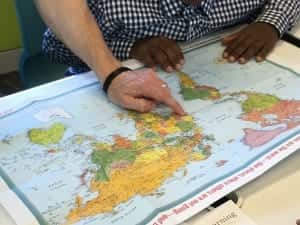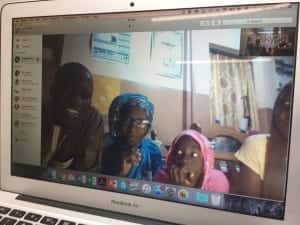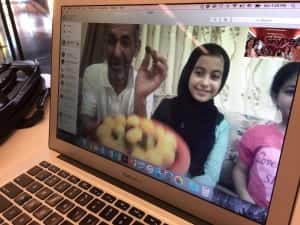International Community Photo Project Results Are In!
Learning Life is pleased to release the results of our international community photo project. The project, which ran from January to August 2017, was part of our flagship program, the Family Diplomacy Initiative (FDI). FDI engages lower-income American families in live dialogues and project collaborations with lower-income families in other nations to nurture more caring and capable global citizens. With each project, families practice a civic skill useful for tackling public issues local to global, like poverty, pollution, violence, or else. This first FDI project got the families to practice their photography skills.
 During the project, five American families in metro DC worked with two families in Dakar, Senegal, and one family in Jerash, Jordan. The eight families comprised 24 total participants: eleven Senegalese, ten Americans, three Jordanians, of whom eight were parents or grandparents, and sixteen were children. Per our FDI selection criteria, all the families were lower-income (household annual income below their nation’s median), had parents with less than a bachelor’s degree, and had minimal engagement with the world, as measured by flights abroad, and contact with any friends or family living abroad. Likewise, none of the participants had previously taken part in any live internet dialogues with strangers living in other countries.
During the project, five American families in metro DC worked with two families in Dakar, Senegal, and one family in Jerash, Jordan. The eight families comprised 24 total participants: eleven Senegalese, ten Americans, three Jordanians, of whom eight were parents or grandparents, and sixteen were children. Per our FDI selection criteria, all the families were lower-income (household annual income below their nation’s median), had parents with less than a bachelor’s degree, and had minimal engagement with the world, as measured by flights abroad, and contact with any friends or family living abroad. Likewise, none of the participants had previously taken part in any live internet dialogues with strangers living in other countries.
The eight families were asked to take photos in answer to the question “what is the nature of your community?” The families each took photos twice, once before and once after basic photography training Learning Life volunteers provided, producing a total of nearly 500 photos from which the families and Learning Life staff selected 70 for inclusion in a photo album on five community themes: public life, food culture, challenges, bright spots, and the future?
To evaluate our project’s impact, Learning Life volunteers scored the families’ photos to assess whether the quality of their  photos improved due to training we provided. We also surveyed the participating family members before and after the project to measure any changes in interest, knowledge as well as attitudes about national superiority and people who are different. Here are the highlights from the research results:
photos improved due to training we provided. We also surveyed the participating family members before and after the project to measure any changes in interest, knowledge as well as attitudes about national superiority and people who are different. Here are the highlights from the research results:
- Photo quality scores on average rose 3%.
- Interest in foreign news, countries, cultures, dialogue and collaboration rose 5%.
- Good feelings about the country the participants dialogued with increased 8%.
- Attitudes of national superiority and intolerance for difference dropped 36%.
Below are some of the participants’ reflections on the project which reveal varied, thoughtful and touching lessons they drew from the dialogues and community photos.
Jenna (11-year old girl from Jerash, Jordan):
Nice people. Americans want to know about me and my culture, which I wasn’t expecting because I thought why would they bother learning about Jordan?
 Marsha (51-year old grandmother from Washington, DC):
Marsha (51-year old grandmother from Washington, DC):
I learned that other cultures share more like than I thought. I learned that education varies with different ethnicities. I learned that food preferences and choices weigh heavily on obesity in different cultures.
Jeannot (35-year old son from Dakar, Senegal):
The [former] Senegalese President Leopold Senghor promoted openness and rooting one’s self in the world. Through Learning Life we explore our cultures. Through the photos we see diverse views, we look back on the past, improve the present, and offer perspectives about the future. When we already know our own culture, Learning Life allows us to discover other cultures, to travel without leaving our country, to improve communication during our dialogues.
Suleman (45-year old father from Jerash, Jordan):
Both American mothers are single moms and it’s hard to raise children alone. They take on all the difficulties in life alone,  without a man. I’m impressed by how the mothers are both the man and the woman, do everything themselves, and have hopes for their children.
without a man. I’m impressed by how the mothers are both the man and the woman, do everything themselves, and have hopes for their children.
Seeing pictures of a black person in front of American government is encouraging. There is tolerance in the pictures that I wish to see around the world. The multi-colored people and kids in the pictures show that the US is for everybody.
The world is going in the wrong direction because of how much canned food Americans eat. There is also the fast-paced life the Americans are leading, which is not healthy. They have less children because of their busy lives.
Our second project, starting in February 2018, will continue with many of the same families, plus new ones in San Salvador, El Salvador. Following on the first project, which revealed striking differences in what the families eat, the second project will explore similarities and differences in the families’ food cultures through interviews the families will conduct with each other and others.
For a copy of the project’s full research report published in the professional journal, Childhood Education, click here.

